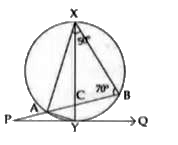If m times the mth term of an A.P. is equal ton times the nth term and m≠n, show that (m+n)th term is zero.
The correct Answer is:am+n=0
Topper's Solved these Questions
- ARITHMETIC PROGRESSIONSBook:ZEN PUBLICATIONChapter:ARITHMETIC PROGRESSIONSExercise:ZEN ADDITIONAL QUESTIONS (LONG-ANSWER [LA] TYPE - QUESTIONS)
Explore 14 Videos
- AREA RELATED TO CIRCLES Book:ZEN PUBLICATIONChapter:AREA RELATED TO CIRCLES Exercise:ADDITIONAL QUESTIONS (HIGHER ORDER THINKING SKILLS)
Explore 7 Videos
- CIRCLESBook:ZEN PUBLICATIONChapter:CIRCLESExercise:ZEN ADDITIONAL QUESTIONS ( HOT [HIGHER ORDER THINKING SKILLS] - QUESTIONS) (IIT AND IMO)
Explore 9 Videos
Similar Questions
If the sum of n terms of A.P. is 12(3n2+7n) , find its nth term and write its 25th term.
View SolutionFind the area of the shaded region portion in the given figure if E is the midpoint of AB,AGE and BEF are quadrants, and DOC is a semicircle.

View SolutionIn the adjoining figure, XY is a diameter of the circle and PQ is a tangent to the circle at Y. Given that ⌊AXB=50∘ and ⌊ABX=70∘, calculate ⌊BAY and ⌊APY.

View SolutionIf m times the mth term of an A.P. is equal to n times its nth term, show that the (m+n)th term of the A.P. is zero.
View SolutionShow that the sum of (m+n)thand(m−n)th term of an A.P is equal to twice the mth term.
View SolutionIf m times the mth term of an A.P. is equal to n times its nth term, then show that the (m + n)th term of the A.P. is zero.
View SolutionIn an A.P. if mth term is n and the nth term is m, where m≠n , find the pth term .
View SolutionShow that the sum of (m+n)thand(m–n)th terms of an A.P. is equal to twice the mth term.
View SolutionShow that the sum of (m+n)thand(m–n)th terms of an A.P. is equal to twice the mth term.
View SolutionIn an A.P. if mth term is n and the nth term is m, where m≠n , find the pth term .
View SolutionIn an A.P. if m times the mth term is equal to n times the nth term then find (m+n)th term.
View SolutionIn an A.P. If m times the mth term is equal to n times the nth term, then find (mn)th term .
View SolutionIn an A.P. if mth term is n and the nth term is m, where m≠n , find the pth term .
View SolutionShow that the sum of (m+n)thand(m–n)th terms of an A.P. is equal to twice the mth term.
View SolutionIf m times the mth term of an A.P is equal to n times its nth term then show that (m+n)th term of the A.P is zero.
View Solution
